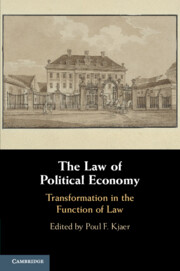Book contents
- The Law of Political Economy
- The Law of Political Economy
- Copyright page
- Dedication
- Contents
- Contributors
- Acknowledgements
- Abbreviations
- 1 The Law of Political Economy
- Part I Studying the Law of Political Economy
- Part II Transformations of the Law of the Globalising Economy
- Part III The Transformation of the Law of Political Economy in Europe
- 8 The Transformative Politics of European Private Law
- 9 Socio-Economic Imaginaries and European Private Law
- 10 The Transformative Socio-Economic Effects of EU Competition Law
- 11 On the Vanishing Functional Autonomy of European Labour Law
- Part IV Towards a New Law of Political Economy
- Index
8 - The Transformative Politics of European Private Law
from Part III - The Transformation of the Law of Political Economy in Europe
Published online by Cambridge University Press: 18 April 2020
- The Law of Political Economy
- The Law of Political Economy
- Copyright page
- Dedication
- Contents
- Contributors
- Acknowledgements
- Abbreviations
- 1 The Law of Political Economy
- Part I Studying the Law of Political Economy
- Part II Transformations of the Law of the Globalising Economy
- Part III The Transformation of the Law of Political Economy in Europe
- 8 The Transformative Politics of European Private Law
- 9 Socio-Economic Imaginaries and European Private Law
- 10 The Transformative Socio-Economic Effects of EU Competition Law
- 11 On the Vanishing Functional Autonomy of European Labour Law
- Part IV Towards a New Law of Political Economy
- Index
Summary
This chapter should be read as an ideological (self-) critique of the role and function of critical legal scholarship in the rise of the “social” after 1960, first, at national level, later, at EU level. Critical legal scholars have all too often understood critical legal theory as practice of theory, in which law is there to help to protect the weaker parties in society and to compensate for the imbalance of power. The decline of the welfare state and the “neoliberal move” in the EU teaches us that law can be politicised not only to promote the “social” in the name of justice but also to de-construct the “social” in the name of economic efficiency. The revival of the political economy provides for an opportunity to re-think the role of law in the secular compromise between capitalism and democracy.
Keywords
- Type
- Chapter
- Information
- The Law of Political EconomyTransformation in the Function of Law, pp. 205 - 227Publisher: Cambridge University PressPrint publication year: 2020
- 3
- Cited by

